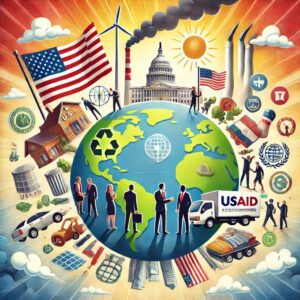Future Climate Crises and USAID Policy 2025
The future of climate crises poses an urgent challenge to global stability, with rising temperatures, more frequent extreme weather events, and heightened risks to biodiversity. These crises threaten food security, public health, and human livelihoods, and their impacts are disproportionately felt by the world’s most vulnerable populations.

Addressing these challenges requires international cooperation, innovation in sustainable technologies, and proactive policy measures that promote climate resilience. However, the Trump administration’s policies, particularly toward climate change and the U.S. Agency for International Development (USAID), created significant obstacles to global climate progress.
During Trump’s presidency, the U.S. withdrew from the Paris Agreement in 2017, signaling a retreat from global climate action. This decision diminished America’s standing on the world stage and weakened international efforts to curb greenhouse gas emissions and limit global warming Future Climate Crises.
USAID, a key agency for U.S. foreign assistance, plays an essential role in climate adaptation, disaster relief, and building resilience in vulnerable regions. However, during Trump’s administration, the agency’s climate programs were deprioritized, and its budget was significantly reduced, raising concerns about its capacity to address pressing climate-related issues.
The Trump administration’s “America First” policy put domestic concerns ahead of international cooperation, leading to a reduction in U.S. foreign aid, including funds allocated to climate initiatives. Critics argued that these cuts undermined long-term development goals and hindered the U.S.’s ability to lead global climate efforts.
Climate crises are inherently interconnected with development issues such as food security, health, and migration. USAID’s role is essential in responding to these challenges by providing resources for renewable energy projects, climate adaptation strategies, and building local resilience in at-risk regions.
Under President Biden, the U.S. has rejoined the Paris Agreement, signaling a renewed commitment to global climate leadership. As Administrator of USAID, Samantha Power has emphasized the need to integrate climate change into U.S. foreign policy and development strategies.
Power took office in May 2021 and has made it a priority to focus USAID’s efforts on climate resilience and sustainable development. At COP28 in December 2023, Power reiterated USAID’s commitment to advancing low-carbon and climate-resilient solutions, particularly in urban settings.
Samantha Power’s leadership marks a significant shift from the previous administration, as she seeks to align USAID’s mission with the global push for climate action. By investing in clean energy, sustainable infrastructure, and climate adaptation, USAID aims to promote resilience and help vulnerable nations cope with the impacts of climate change.
In addition to Power, Dr. Cindy Huang, Director of the Office of Policy at USAID, plays a key role in shaping the agency’s climate agenda. While specific public statements on climate policy are limited, the Office of Policy is responsible for integrating climate considerations into USAID’s long-term development strategies.
USAID’s future effectiveness in tackling climate change will depend on its ability to invest in renewable energy, climate adaptation, and local capacity-building. As the world grapples with increasingly severe climate impacts, the agency must continue to prioritize climate resilience in its programs and partnerships. With future leadership, USAID must focus on ensuring that climate change is at the center of its development efforts. As climate change exacerbates existing vulnerabilities, USAID’s expertise in disaster response and building resilience will be critical in the coming years.
The next leadership at USAID will play a pivotal role in shaping the agency’s climate response. The challenge will be to integrate climate considerations into all aspects of development work and ensure that climate adaptation and mitigation are central to U.S. foreign policy.
By increasing investment in clean energy, promoting sustainable practices, and enhancing partnerships with affected communities, USAID can help reduce the long-term impacts of climate change. Rebuilding the agency’s capacity to address climate change can enhance the U.S.’s role in global climate action.
The future of USAID in addressing climate crises hinges on strategic investments in climate resilience, a renewed commitment to international agreements, and strong leadership. By integrating climate change into its development programs, USAID can help mitigate the impacts of climate change and support vulnerable populations worldwide.
Ultimately, the U.S. has an opportunity to reclaim its leadership in combating climate change and promoting global sustainability. USAID’s role will be essential in addressing the complex, interconnected challenges of the climate crisis, ensuring a sustainable future for all.








Leave a Comment